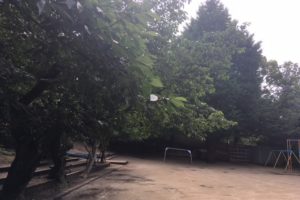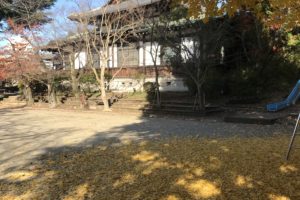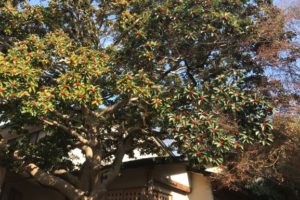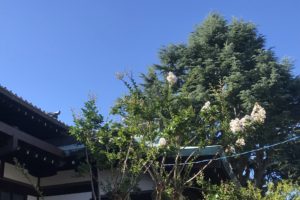2nd Sunday in Lent, Year A. March 5, 2023
John 3:1-17
Rev. Misa Furumoto
Today is the second Sunday in Lent, and Easter is only five weeks away. How are you all spending this Lenten season? When we think of Lent, the image of fighting temptation is very strong. Just like Jesus, who fasted for 40 days and 40 nights in the wilderness and overcame the devil’s temptation with the word of God, we too are supposed to turn towards God and resist the temptations of the flesh. The Lenten practice of self-denial is a way to offer our feelings to God by overcoming ourselves. This is not wrong and is actually very important, but I think it’s a little “mottainai” if we have see these 40 days as something heavy and tough just for the sake of doing so.
I personally like to see these 40 days as a time of anticipation and excitement for Easter and the joy of resurrection. Easter is now known by many young people in Japan as a “spring festival.” Some years ago, it started with Disneyland, but now even local supermarkets put “Happy Easter” stickers on all kinds of egg dishes. Easter falls on a different day each year, but in the Northern Hemisphere, it usually falls between March and April, just as the seasons change. It coincides with the arrival of spring, where the long, cold, dark winter ends, ice melts, birds chirp, trees bud, and flowers bloom. It’s a transition from a season that seems to have stopped breathing and died to a season overflowing with life, a season of being “born anew.” This morning’s Gospel of John tells a fascinating conversation between Jesus and a man named Nicodemus about being “born anew.”
Nicodemus was a Pharisee and a member of the Sanhedrin, the highest court in Judaism. This means that they were people who believed that they could be saved by obeying the hundreds of laws that were thought to be God’s commandments in the Old Testament. They considered those who could not keep these laws to be failures and sinners. Because of this, they did not like Jesus from the beginning. Jesus did not superficially obey the law, but instead he reinterpreted and taught its true meaning, and performed many miracles that seemed to demonstrate that he was the Son of God.
The Jewish leaders, particularly the Pharisees, had been looking for an opportunity to capture Jesus early on, believing that they needed to do something about him. However, this man named Nicodemus visited Jesus alone at night, perhaps to avoid being seen by others. He may have been curious about Jesus and wondered if he really was the Son of God who was sent from heaven. When Nicodemus first met Jesus, he greeted him with the highest compliment he could think of. But instead of responding to his greeting, Jesus saw through Nicodemus’ thoughts and his understanding of salvation, and told him plainly, “Very truly, I tell you, no one can see the kingdom of God without being born from above.” This meant that Nicodemus could not be saved in his current way of living. He got puzzled by this and asked, “How can anyone be born after having grown old? Can one enter a second time into his mother’s womb and be born?” He just did not understand what Jesus meant by “born from above”, which could also be said “born anew.”
The plum trees in the church are finally beginning to bloom, and the cherry blossoms will probably be in full bloom by the end of the month. After losing their leaves and appearing to have died in winter, they bloom all at once just like last year. Perhaps Nicodemus understood being “born anew” in a similar way – as if he would become a baby again and be born from his mother’s womb once more.
But Jesus didn’t mean that. When he spoke of being “born from above” or “born anew”, he meant being reborn into something entirely new, different from one’s current self. Imagine the transformation of a caterpillar into a butterfly, which sheds its old skin and emerges with wings to fly. Before, the caterpillar could only crawl on leaves, but once it transforms, it can go up in the sky and see the world from a new perspective. This is what it means to see God’s kingdom. It is not merely observing from the outside but immersing oneself in it, experiencing the wind, the warmth of the sun, encountering other creatures that God has lovingly created. To be reborn into God’s kingdom is to live under God’s protection and care, in a perfect world ruled by God.
This is what Jesus meant by being “born from above”. However, there is one significant difference between the process of a caterpillar turning into a butterfly and us humans being born again. That difference is the process of transformation. Caterpillars must create a pupa by spinning a thread and attaching themselves to a branch in order to transform into a butterfly. They must then use their own strength to break out of their cocoon.
Actually, Nicodemus, too, who was a member of the Pharisees, believed this as well. He was caught up in the idea of what he needed to do to be saved, what actions he needed to take, and whether he was capable or not.
In response to that, Jesus said something totally different. We need to be born from above. We are to be born again not by ourselves but by God. This happens through baptism, which is a symbol of being cleansed by water and spirit. Simply by accepting Jesus as our savior and participating in his death and resurrection, we can be born again and live in God’s kingdom. By the way, during today’s Japanese service from 10:30, 3 small children are getting baptized. If you have time, please remain and share the joy of our church.
We cannot save ourselves through our own thoughts and efforts. Jesus says, “The wind blows wherever it chooses, and you hear the sound of it, but you do not know where it comes from or where it goes.” This is a powerful statement that moves our hearts. The “wind” is the same word as the “Spirit” that was mentioned earlier, the Holy Spirit. The Holy Spirit is God’s love and care for us. We cannot control this wind, but through God’s unmerited grace, it enters our hearts and we are born anew, able to see God’s kingdom. We don’t have to try so hard; we just need to believe in God. This is what God said to Abraham, and this is today’s message from the Bible. Let me read again the famous passage John 3:16 called “Gospel in miniature” by Martin Luther.
“For God so loved the world that he gave his only Son, so that everyone who believes in him may not perish but may have eternal life.”
The Lenten season is a time for us, like the caterpillar, to immerse ourselves in God’s great love and forgiveness while we are in our cocoon. If we focus only on struggling and overcoming our own suffering, it will be counterproductive. Rather, we should want to offer more gratitude and praise to God during this time. Then, on Easter Sunday, as we celebrate the resurrection of Jesus, let us also become butterflies and be filled with joy, becoming messengers of the gospel to this world.
In the name of the Father, of the Son, and of the Holy Spirit, Amen.













